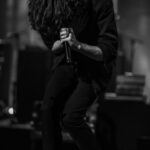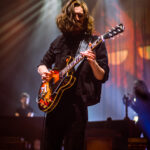Photography by Sam Wachs
By Lily Doolin
Before kicking off his sold-out, two-night stint at the Wang Theater in Boston on November 12th and 13th, Irish singer-songwriter Hozier (aka Andrew John Hozier-Byrne) spoke with WERS Blog Editor Lily Doolin about a world in crisis that inspired his latest record Wasteland, Baby!, and how there's still hope amidst the chaos.
I wanted to start off asking about this tour. It's a huge tour for you, you've been selling it out left and right. How's it been for you so far, and what's been different this time around than other tours for you?
Hozier: This tour, there's been more of us on stage, which has been really fun. This is a larger band by one member, but it feels like there are a lot more people onstage. The rooms are a little bit bigger [laughs], the production has kind of gone up a little, there's a screen up behind us. The stage is a bit more elaborately set up. Then, the songs are kind of a bit more energetic as well too, so there's that. Having another album's worth of material to choose from has been great.
What has been your most exciting song to perform this tour, speaking of the new songs?
H: I think "Dinner and Diatribes" has been a great one. That is super fun to play onstage, everything has to be all-hands-on-deck for a lot of numbers because there are so much harmony and production going on for those ones, there's a lot of moving around and playing different things.
I know that this was quite a while ago, but I'd like to take it back to May of this year. You played Boston Calling for us all that time ago in that nice warm weather [laughs]. If you can recollect, what was it like being at that show and playing for that kind of a festival?
H: That was definitely different. I've done Boston Calling twice, and I believe that was a new campus, or a new venue?
Yes! It was at Harvard Athletic Complex. Before they would just dump it on the steps of City Hall [laughs].
H: It seemed a lot more downtown than the first time around! Second time around, again, it felt like a much, much different time, it was a much bigger festival. But it was really fun, a really fun crowd.
Obviously, you're touring for Wasteland, Baby! We love it at the station. I wanted to ask you about this record, it's got this very ominous feel and aesthetic to it, very apocalyptic, end-of-the-world type vibe. I was wondering what inspired that. It seems like a heavy concept to deal with, so how did that enter your headspace?
H: There were a few things. First and foremost was just the news cycle, the 24 hours news cycle. I came off the road and I didn't really have a hobby [laughs], so all of my focus and energy on tour left me with this extreme adrenaline, being at 100% the whole time, and that left me trying to connect with what the real world was again, because touring is such a weird bubble. I ended up going, "Okay, I'll just follow every news source I can and every correspondent," and that was like…
Soul-sucking?
H: Yeah [laughs], there was just no good news! It was all, like, climate disaster reports. And at the time, obviously you had these two huge political upheaval events in the UK, and on both sides of the Atlantic as well. It was just the feeling of that. You had Brexit, etc. And then you had, like-I talk about it on the song "Wasteland, Baby!"-there's this thing called the Bulletin of Atomic Scientists, which is a community of global scientists that put their heads together, and they've done this for many, many decades, and they kind of decide how much of a threat we are to our own species. There's a thing called the Doomsday Clock, and depending on where the minute-hand is, that's how close it is to midnight, and that's a kind of a general consensus of how at-risk we are to society as we know it coming to an end. They moved that forward to two minutes to midnight, which is the closest it's ever been to midnight. The only time it's been as close as that was the Cuban Missile Crisis during the Cold War. And that was this kind of an "ah, cool?" moment [laughs]. It was just like, "Well, this isn't good." I was kind of leaning into the anxiety of that and the concern of that and finding little things in it, very good and very bad.
Is this album, for you, meant to be a snapshot of a world in crisis? Is there meant to be a message of hope at the end? Or is this your version of "it is what it is"?
H: I would be reticent and reluctant to say what it's meant to be, and if there's meant to be a sort of message. There're moments of it that find hope, and there are moments that just embrace the despair of that too, so it's just trying to explore that across the spectrum of all the feelings that are offered. Some of them are hopeful, some of them are encouraging, some of them feel, "This can absolutely be overcome," and some don't.
I'm not sure if you intended this to be a concept album-I mean what even is a concept album these days-but did you pick and choose and say, "These songs all seem to convey this conglomeration of an idea," or was the process more of a, "I'm just going to write and see what happens"?
H: It was kind of a mix of both, it was mostly just writing and seeing what happens. What I came away with was, across all of the songs that I was writing, there was always this feeling of "what can be lost?" And, "what is there to be lost?", even in the fun songs. When Wasteland, Baby!was written and finished, the term "wasteland, baby," in a fun way, sort of summed up all the elements of the album. Some of the more fun, frivolous songs, they're still kind of playing around with what I felt was a cultural wasteland, so to speak. People eating gold, just references to that obscene, completely amoral, shocking abundance of wealth in the face of such crisis. Stuff like that [laughs]. So "wasteland, baby" seemed to sum it up, but I don't think it was as direct as saying at the starting point, "I will set out to write this certain thing."
I hate to make you pick favorites, but if you had to pick one song on this album that you are most proud of, which would it be?
H: Um… that's super hard [laughs]. It really is like picking which of your children you like the most. I think, just for the fact of working with Mavis [Staples], and working also with Booker T. Jones, "Nina Cried Power." It was a song I nearly abandoned many, many times. I was very glad to have worked with Mavis, and to get to know her as well.
I wanted to ask you about "Nina Cried Power." I stumbled upon the Podcast you did surrounding the meaning behind "Nina Cried Power," and the inspiration of it. What made you want to take that song beyond the record and shape it into a sort of commentary?
H: When you're writing anything, there's a mix of intention and instinct that you're juggling as you're moving with it, watching it grow and hoping that there's something worthwhile about it. I think on that one, the kind of genesis point of it, or the beginning point of it was, of all the things that are taking place, which one is even worthwhile to start talking about? What is even a worthwhile starting point? Is it worth even aiming to have a starting point to address that or look to it or try to write about it? The starting point that I landed on was the legacy of people who have done that before, the legacy of artists like Nina Simone, Mavis Staples, or other people referenced in that song like John Lennon or Woody Guthrie, who seemingly effortlessly-or in hindsight it looks effortless-decided to write about things going on in the world around them and do so as honestly as they could. Taking that as a starting point and going, "Look, there's a well at least to be drawn from, and you can draw from that well since it's lasting and it's valid and there's a reason why we hold those artists as sacred because they offered so much." They were honest and brave and sang out about what they needed to do. I suppose that, just writing to that, as a thank you note to that and to them. I suppose that's the long way of putting it.
It's a great way of putting it. There are a lot of artists that shy away from stepping into that "hot water" of trying to make a statement, and I think that is so important. Even if it's not a clear, definitive statement, just getting involved in any way you can, even just making art from that type of material is important.
H: Yeah, it is a tricky one. I can see why many artists are reluctant to stick their head out on certain issues.
Going away from specific songs on the album, what is one thing you hope that people take away from listening to this album?
H: I mean, there's a lot of things I could say. I view it very much as, it's the second album of what I hope is going to be many, many albums. I hope it's enjoyed, and taken for what it is, and at points taken with a pinch of salt. For me, it was always just trying to capture, even at the worst, the last point imaginable, the last two people alive, that there's always that silver lining, that potential to find some warmth in people. That was very much the kernel or the grain at the heart of the album.
As you said, this is hopefully the second album of very many more. What is different from Hozier now than Hozier before?
H: I don't know! [laughs] I don't know, because I don't really know what it was before either. I think the longer I spend thinking more about what that is, the less time I spend thinking about what the songs need to be, and for me, I just try to approach each song with whatever each song needs. I'd leave the comparisons to observers or critics [laughs].
Has your songwriting process evolved at all, then?
H: It has changed in certain ways, in the way that I would approach things. I think the basics of it have not, and that's something I'd hoped to hang on to with this record, and why I took a bit more time with it. The intention for the song and the way that it was approached and the ethos of what I wanted out of the song, and a song could be at its simplest or at its highest level, and I was still trying to approach it like that, in the same sort of patient way, letting the song be what it needs to be. But yeah, it's changed, and I'll be releasing songs within a few months, ones I've written on the road.
In the moments between when you got a break [laughs].
H: Yeah [laughs], and I think that also informs the process, the way that you write, you write a bit quicker and more efficient.
Is there anything, in particular, coming down the pipeline music-wise? Something a little different?
H: In the next few months, I'll be releasing either a four or five-track EP, which will be fun. There's one song on that, which I'll probably play tonight. It kind of is more first-album in the way that it's more just electric guitar and drums. I wouldn't say rock, but more blues, juke-joint type vibe. In it, I was kind of leaning into the Woody Guthrie tradition of songwriting. Definitely singing out what hesitations I had about "Nina Cried Power." They're out the door [laughs]. I'm doing the Woody Guthrie approach, which is just, "Here's the thing I'm talking about." So that's a fun one, but it'll be a live track actually that we've recorded on the road.









